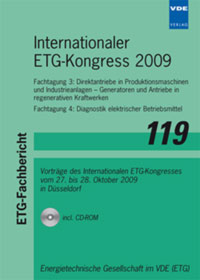Torque density increase of multi-pole permanent magnet tooth-coil synchronous motors using the reluctance torque
Conference: Internationaler ETG-Kongress 2009 - Fachtagung 3: Direktantriebe in Produktionsmaschinen und Industrieanlagen - Generatoren und Antriebe in regenerativen Kraftwerken / Fachtagung 4: Diagnostik elektrischer Betriebsmittel
10/27/2009 - 10/28/2009 at Düsseldorf, Germany
Proceedings: Internationaler ETG-Kongress 2009
Pages: 6Language: englishTyp: PDF
Personal VDE Members are entitled to a 10% discount on this title
Authors:
Mirzaei, Mehran; Binder, Andreas; Funieru, Bogdan (Institute for Electrical Energy Conversion, Darmstadt University of Technology, Landgraf-Georg-Strasse 4, Darmstadt, Germany)
Abstract:
The mechanical and magnetic analysis of different configurations of high torque 45 kW permanent magnet synchronous machines with tooth-coil stator structure and interior permanent magnet rotors is presented. The aim is to maximize the total torque in 16 pole motors by increasing the intrinsic reluctance torque. For a given magnet volume the torque may be increased by 40% with respect to surface mounted magnets. Two stators with q = 0.5 and 0.25 slots per pole and phase are calculated in combination with two rotors, including embedded V-shaped and flat I-shaped magnets. The mechanical rotor stress calculation is done at over-speed (1.2·5000 = 6000/min). For a high reluctance torque the air-gap is minimized, which causes increased rotor losses due to the space harmonics, so the maximum speed has to be limited to 3000/min to limit the harmonic rotor losses. Magnetic calculation results include torque, terminal voltage and losses at no-load and load conditions for rated speed 1000/min and maximum speed 3000/min. The sudden short circuit calculations are done to test the demagnetization limit of the magnets at 150 °C magnet temperature.


